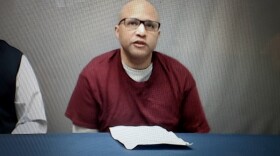A group of Oklahoma conservative lawmakers and faith leaders held a press conference to call for a moratorium on the death penalty last week. Republican Representative Kevin McDugle made his intentions clear.
“I do not want to abolish the death penalty in Oklahoma, that’s not the purpose,” McDugle said. “I simply want the AG’s office, our DAs, our Legislature, to implement a policy that keeps an innocent man from being put to death.”
Concerns about Oklahoma death row inmate Richard Glossip’s claim of innocence led McDugle to call for an independent review of his case in 2021. Earlier this year, Attorney General Gentner Drummond appointed a special counsel to conduct such a review.
McDugle also pointed out the 10 men who have been exonerated from Oklahoma’s death row in the past few decades - 10 innocent men who the state almost executed.
“I could not stand to see an innocent man put to death in Oklahoma. And I happen to know that Oklahomans don’t want to put an innocent man to death either,” McDugle said.
While some conservatives like McDugle support pausing executions so issues with the state’s implementation of capital punishment can be investigated, others are in favor of getting rid of the death penalty altogether.
Demetrius Minor, the national manager of Conservatives Concerned About the Death Penalty, said capital punishment does not align with key conservative values.
“Our position is that we want to see the death penalty eradicated. The death penalty contradicts the pro-life stance, because being pro-life is pro-life, not just pro-birth,” Minor said. “Fiscally, the death penalty also does not align with conservative values because it’s more expensive to execute someone than it is to have someone serve a sentence of life without parole.”
Similarly, John-Mark Hart, the lead pastor at Redemption Church in Oklahoma City and one of the several Oklahoma clergy members who have previously called for a moratorium on the death penalty, said many Christians are against capital punishment because it goes against their faith.
“Christians have at the core of our view of reality both the sacred dignity of every human life and the redemptive power of mercy,” Hart said. “Sometimes, some strong voices among Christians who maybe even support the death penalty or have different views of this have dominated the conversation in a way that really doesn’t reflect the majority of what Christians think and feel.”
Changing the hearts and minds of other conservative Christians is the best way Brett Farley sees to secure a moratorium. Farley is the executive director of the Catholic Conference of Oklahoma and the state coordinator for Conservatives Concerned about the Death Penalty.
“In a red state like Oklahoma, if we’re going to move the needle on this issue, we have to do it through conservatives and specifically through the Republican Party because that’s who controls the strings of power in the legislature,” Farley said.
Abraham Bonowitz, a death penalty abolitionist and founder of Death Penalty Action, has experience changing people’s hearts and minds about capital punishment. In 2016, he worked with the Oklahoma Coalition to Abolish the Death Penalty going door to door in Oklahoma County to discuss State Question 776, which ultimately passed and added the state’s right to perform executions to the Oklahoma constitution. However, he said the organization’s efforts proved something important.
“We were able to bring the support for that referendum down from about 72% to about 66% statewide,” Bonowitz said. “But we also demonstrated that where people understand the issue, they don’t support it. The more you know about the death penalty, the less you like it. Even if you support it in concept.”
Oklahoma conservatives who support the death penalty in concept and others who are against it entirely might have different long-term goals for the state, but Hart said they have the opportunity to come together to address one thing they agree on.
“The death penalty, as it’s being practiced right here, right now, is deeply tainted in many ways. And we cannot continue doing it like we’re doing it now,” Hart said.
The governor can institute a moratorium, but there may be other avenues. In January, AG Drummond requested the next seven executions be rescheduled with more time in between, and the Court of Criminal Appeals granted his request. Farley describes it as a “mini-moratorium.”
As it stands, Oklahoma’s next scheduled execution is for Richard Glossip - on May 18, 2023.
KGOU is a community-supported news organization and relies on contributions from readers and listeners to fulfill its mission of public service to Oklahoma and beyond. Donate online, or by contacting our Membership department.








